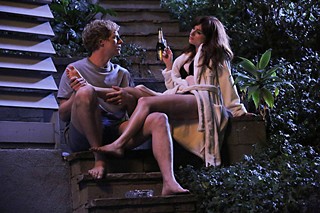Do Your Worst
TV showrunner Stephen Falk on his anarchic FX rom-com, You're the Worst
By Rod Machen, Fri., Jan. 30, 2015
Stephen Falk's You're the Worst is a romantic comedy with bite and lots of bad behavior. The premise may be familiar – it's about a guy and a girl negotiating a new relationship – but the execution is fresh, funny, and surprisingly frank about sex. After a critically acclaimed first season last summer, FX picked up the show for a second season. Falk will be in Austin Feb. 1 to talk about his work and the business of writing for television.
Austin Chronicle: You're the Worst has captured the imagination of many. How did you approach writing a dark comedy for television?
Stephen Falk: I tried to tap into things that interested me and not worry about possible reception. I had gone through a bit of letdown with an NBC show that I did called Next Caller, and this came out of having taken a big swing and missed. I, ironically or counterintuitively, wasn't afraid anymore. I came out of that situation more determined than ever to just do what I wanted to do, tell the stories that I wanted to tell, and trust that I had a place in this business, that I had a voice that people would react to.
AC: Sitcoms have their tropes. How did you choose what to keep, such as the best friends, and what to mess with?
SF: Tropes of genres are established for a reason. It's quite helpful when you have two prospective romantic partners to have a sounding board for each of them. They don't have to be a same-sex friend, but it's what's been done. For me it was good because then I got to have those best friends realize and rebel against the fact that they're just sidekicks. While it's helpful, it's also completely unrealistic. Even though our show is heightened at times, I think we're very cognizant of trying to make sure we're representing stuff that people could actually do and things people could actually say.
AC: What's the balance between making your characters "the worst" without making them too unlikable?
SF: If you come at it from a humanistic point of view and don't judge your characters but rather draw them as deeply flawed human beings who are figuring things out, and make sure they're operating under the truth for themselves, and you understand where their backstory is – if you approach that from an honest and well-meaning place, if you're not just doing things to have them be dicks but rather do things to demonstrate their singular humanity, I think you can get away with a lot. However, you do have to be aware that there are certain things you just can't do and be aware of what will turn off an audience in a way it would turn you off.
AC: In 2000 you won the Comedy Screenplay Competition at the Austin Film Festival. What did that do for you at that point in your career?
SF: I think it gave me a little bit of extra confidence. It also helped legitimize me a bit. It's hard for executives to find new talent. You need those gatekeepers, and screenplay competitions have become de facto gatekeepers. It gave executives more confidence that they weren't going to be wasting an hour and a half reading my script.
AC: You're coming back to Austin for a talk. What can people expect?
SF: It'll be partially anecdotes from the front lines. Hear what it's like to be in a writer's room. It'll also be some practical advice for people who are trying to do this. I talk to people a lot about the craft of writing and things I've learned. And generally whatever people want to know, I'm willing to talk about.
The Austin Film Festival presents A Conversation With Stephen Falk on Sunday, Feb. 1, 2pm at the Holiday Inn on Town Lake. See www.austinfilmfestival.com for details.










